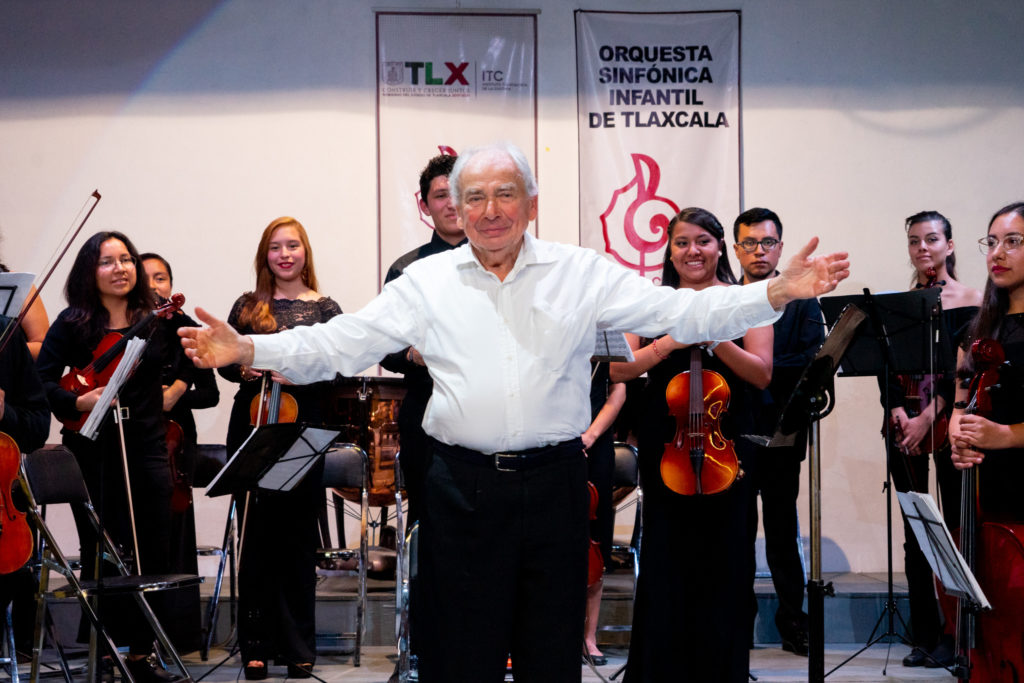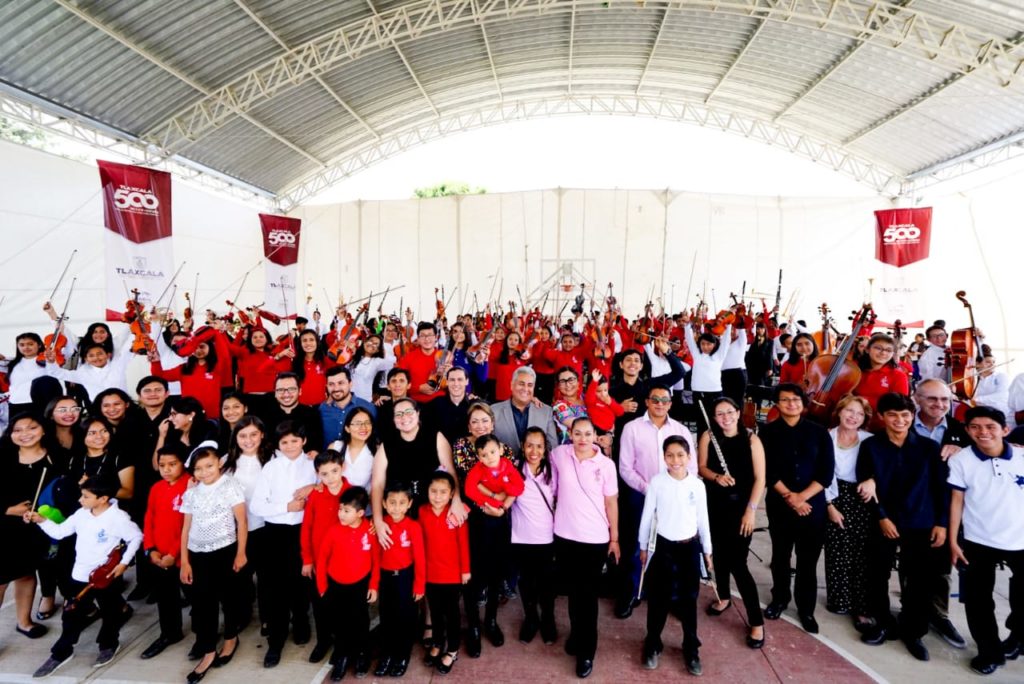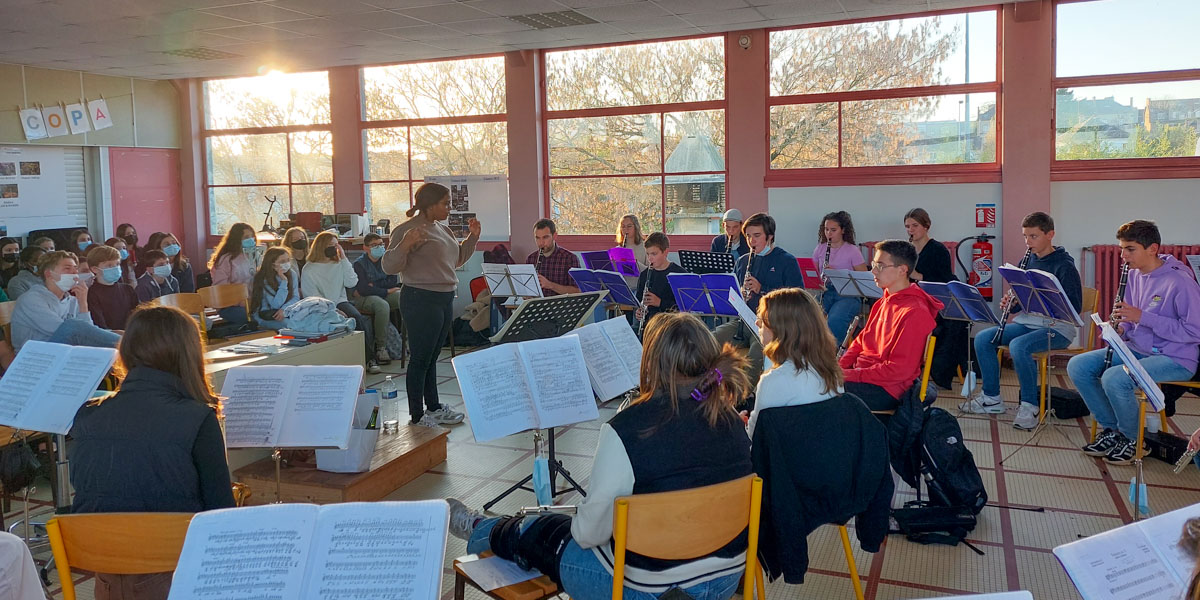
Topics
News & Resources
News & Resources
The Global Leaders Plant a Musical Seed in Tlaxcala, Mexico
by Raul Vergara
Co-Founder and International Programs Director, Global Leaders Program

Tlaxcala, located in the heart of Mexico, is one of the states with the greatest cultural activism in the country. In fact, it is a referent at the national level in terms of student participation of musical programs, a process inspired by the Venezuelan model “El Sistema”, which was first implemented in Tlaxcala 30 years ago. Within this process, the role of Casa de Música (Music Home)—an initiative of the Tlaxcalan Institute of Culture—has been very important, allowing for thousands the opportunity to approach a musical instrument through the different venues offered by the state.
While participation of students (k-12 level) in music programas is high, it decreases considerably at the higher level of education (college age). There are multiple reasons for this, including the lack of professional opportunities in music. In fact, Tlaxcala is one of the few states in the country that does not yet have a professional symphony orchestra. This makes for a significant exodus of talent, as trained musicians move other sectors of the country in search of higher education and professional development possibilities.
In July of this year, The Global Leaders Program was held in Tlaxcala, Mexico. Called the “500 years Symphonic Festival,” it was part of the Commemoration of the 500th anniversary of the Meeting of Two Cultures—that is, since the arrival of the Spaniards in the area and their encounter with Tlaxcallan cultures.
Led by a team of 17 professors from Mexico and abroad, The Global Leaders Program offered an intensive musical improvement opportunity to 215 Tlaxcalan children, youth, and adults, whose ages ranged between four and 42 years of age. This was an essentially collaborative process, integrating learning for both students and teachers from different music programs across the state.
For two weeks, the Program implemented a special curriculum focused on technical and musical development for all levels. Activities based on Suzuki methodologies were developed with an initial violin group, while on a higher performance level, both individual and collective learning processes were developed through personalized lessons, rehearsals, and concerts. For teachers, a special program was implemented: Sistema Educators Bootcamp, an intensive program offering with practical pedagogical tools for Teaching Artists committed to social development through music.
The team of coaches was led by Leon Spierer, Concertmaster of the Berlin Philharmonic (R); Mary Ann Mumm, professor at the University of MontClair; and Craig Mumm, Associate Principal Viola of the Metropolitan Opera of New York. The lead coaches guided the activities of a large group of teachers, representing institutions such as the Orchestra of the Teatro Bellas Artes de México, the Orquesta Sinfónica de Xalapa, the Philharmonic Orchestra of Boca del Río, the Filarmónica Tlaxcallan, the Symphony Orchestra of the National Theater of Brazil, the Orchestra of the Met of New York, the Orchestra of the Americas, and the programs Orquestando Armonía Program and Project Music program, from Mexico and USA, respectively.
These intensive workdays culminated in four concerts, in which the students demonstrated the skills and musical growth they had achieved in chamber and orchestral playing, in front of parents, music teachers, and the general public. Chilean Conductor Felipe Hidalgo Harris, who has extensive experience in orchestral processes with Latin American youth, shared some powerfully motivating words:
“Do not dream alone! This program allows children to see, in their teachers and musicians, a dream conferred. It is like a time machine, because we teachers reflect on them, and remind them that everything can be achieved. Music gives children, adults, parents, and all kinds of people, an emotional and intellectual openness for a musical future and for other life activities. Leaders are formed—because making music requires important decisions, organizing, being punctual, and always looking for the best possible level to improve.”
The Global Leaders Program has achieved remarkable results, thanks to the work, collaboration, and commitment of its teachers to reach places like Tlaxcala, Mexico and other parts of the world. They teach and show children and young musicians the path to reach their dreams, with the message that everything can be achieved with discipline and perseverance.
In the words of León Gieco, Argentine musician and composer, “Music is a broad thing, without limits, without borders, without flags.”
Editor’s Note: Articles from Raul Vergara’s Global Leaders Program often appear in The World Ensemble.

Berlin Philharmonic Concertmaster Leon Spierer, who was head of Festival faculty, with the Festival String Orchestra Ensemble.

All students and faculty at the closing concert of the Festival.
Related Content
Events/Performances, Gather Together, News and Resources, North America, the world ensemble, Uncategorized

El Sistema USA Invites Sistema Europe to Participate in Upcoming Virtual National Symposium and Seminario
longy-admin




